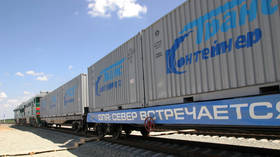New infrastructure project may reshape trade between India and Middle East – media

Leaders of the US, India, Saudi Arabia and the United Arab Emirates could soon strike a major joint infrastructure deal that would connect countries in the Middle East by rail and India by sea. The agreement could be announced during this weekend’s G20 Summit in New Delhi, the Axios website reported on Friday, citing sources familiar with the matter.
If implemented, the project is expected to link Arab countries and the Persian Gulf region through a network of railways that will also connect to India via seaports in the Gulf, the sources said.
The new transport routes would involve maritime transit between India and Saudi Arabia, rail links through Saudi Arabia and the UAE to Jordan, and ship transit to Türkiye, according to a diplomat familiar with the negotiations.
The infrastructure project is one of several initiatives that the Biden administration is pushing in the Middle East to counter China's growing influence in the region, the outlet wrote.
The Middle East is an important part of Beijing's Belt and Road Initiative. Sometimes referred to as the New Silk Road, the project seeks to improve trade by linking Asia, Europe, Africa and South America through expanded transport infrastructure.
Washington's project has also been described by some experts as a rival to the International North South Transport Corridor (INSTC). The INSTC, touted as an alternative to the Suez Canal, is a planned 7,200km multi-mode transit system that will connect ship, rail, and road routes for moving cargo between Russia, Iran, Azerbaijan, India, and Central Asia.
Russia seeks to ensure interconnectivity within the route and launch regular freight shipping lines. It is expected that the volume of goods shipped via the INSTC will almost triple over the next seven years.
The total cargo flow along the North-South Transport Corridor was 14.5 million tons in 2022, and the projection for this year is 17.6 million tons, according to Russia's Transport Ministry.
The negotiations regarding the US-led infrastructure deal, aimed at reshaping trade between the Middle East and South Asia, have been underway for months. However, the current stage of negotiations might not yield a concrete result to be announced during the G20 Summit in Delhi, according to Reuters.
For more stories on economy & finance visit RT's business section













